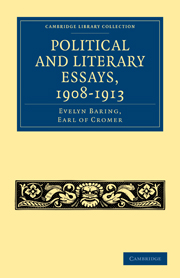Book contents
- Frontmatter
- PREFACE
- Contents
- “THE EDINBURGH REVIEW”
- “THE QUARTERLY REVIEW”
- “THE NINETEENTH CENTURY AND AFTER”
- “THE SPECTATOR”
- VIII DISRAELI
- IX RUSSIAN ROMANCE
- X THE WRITING OF HISTORY
- XI THE GREEK ANTHOLOGY
- XII LORD MILNER AND PARTY
- XIII THE FRENCH IN ALGERIA
- XIV THE OTTOMAN EMPIRE
- XV WELLINGTONIANA
- XVI BURMA
- XVII A PSEUDO-HERO OF THE REVOLUTION
- XVIII THE FUTURE OF THE CLASSICS
- XIX AN INDIAN IDEALIST
- XX THE FISCAL QUESTION IN INDIA
- XXI ROME AND MUNICIPAL GOVERNMENT
- XXII A ROYAL PHILOSOPHER
- XXIII ANCIENT ART AND RITUAL
- XXIV PORTUGUESE SLAVERY
- XXV ENGLAND AND ISLAM
- XXVI SOME INDIAN PROBLEMS
- XXVII THE NAPOLEON OF TAINE
- XXVIII SONGS, PATRIOTIC AND NATIONAL
- XXIX SONGS, NAVAL AND MILITARY
- INDEX
XVIII - THE FUTURE OF THE CLASSICS
Published online by Cambridge University Press: 07 September 2011
- Frontmatter
- PREFACE
- Contents
- “THE EDINBURGH REVIEW”
- “THE QUARTERLY REVIEW”
- “THE NINETEENTH CENTURY AND AFTER”
- “THE SPECTATOR”
- VIII DISRAELI
- IX RUSSIAN ROMANCE
- X THE WRITING OF HISTORY
- XI THE GREEK ANTHOLOGY
- XII LORD MILNER AND PARTY
- XIII THE FRENCH IN ALGERIA
- XIV THE OTTOMAN EMPIRE
- XV WELLINGTONIANA
- XVI BURMA
- XVII A PSEUDO-HERO OF THE REVOLUTION
- XVIII THE FUTURE OF THE CLASSICS
- XIX AN INDIAN IDEALIST
- XX THE FISCAL QUESTION IN INDIA
- XXI ROME AND MUNICIPAL GOVERNMENT
- XXII A ROYAL PHILOSOPHER
- XXIII ANCIENT ART AND RITUAL
- XXIV PORTUGUESE SLAVERY
- XXV ENGLAND AND ISLAM
- XXVI SOME INDIAN PROBLEMS
- XXVII THE NAPOLEON OF TAINE
- XXVIII SONGS, PATRIOTIC AND NATIONAL
- XXIX SONGS, NAVAL AND MILITARY
- INDEX
Summary
“The Spectator,” July 5, 1913
There was a time, not so very long ago, when the humanists enjoyed a practical monopoly in the domain of English education, and, by doing so, exercised a considerable, perhaps even a predominant, influence not only over the social life but also over the policy, both external and internal, adopted by their countrymen. Like most monopolists, they showed a marked tendency to abuse the advantages of their position. Science was relegated to a position of humiliating inferiority, and had to content itself with picking up whatever crumbs were, with a lordly and at times almost contemptuous tolerance, allowed to fall from the humanistic table. Bossuet once defined a heretic as “celui qui a une opinion” (αἵρεσις). A somewhat similar attitude was at one time adopted to those who were inclined to doubt whether a knowledge of Latin and Greek could be considered the Alpha and Omega of a sound education. The calm judgment of that great humanist, Professor Jebb, led him to the conclusion that the claims of the humanities have been at times defended by pleas which were exaggerated and paradoxical—using this latter term in the sense of arguments which contain an element of truth, but of truth which has been distorted—and that in an age remarkable beyond all previous ages for scientific research and discoveries, that nation must necessarily lag behind which, in the well-known words uttered by Gibbon at a time when science was still in swaddling-clothes, fears that the “finer feelings” are destroyed if the mind becomes “hardened by the habit of rigid demonstration.”
- Type
- Chapter
- Information
- Political and Literary Essays, 1908–1913 , pp. 307 - 316Publisher: Cambridge University PressPrint publication year: 2010First published in: 1913

